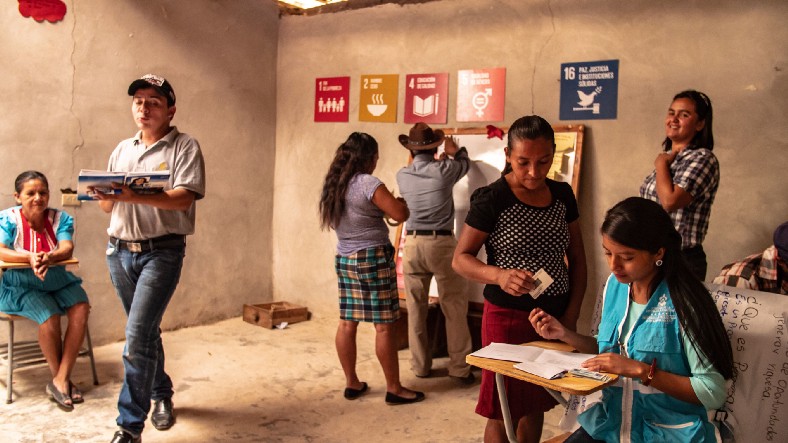To cap off our series of UN75 Dialogues, on 22 June, panelists and speakers discussed the challenges our economy is facing and what kind of solutions we can look to as the world recovers from this global crisis.
The COVID-19 global pandemic has exposed a profoundly interconnected yet fragile global economy and deep economic divides. As countries begin to open and the world works toward emerging from the health crisis, we must address the economic crisis. Under the theme Economic Transformation: Rebuilding Better, the final UN75 Dialogue in our three-part series addressed just that.
Panelists:
- Ana Saldarriaga | Deputy Head and Impact Lead, Global Shapers Foundation
- Cindy Pearl Maphumulo | Managing Director, The Business Development Agency; Lead, Africa80
- Nisaa Jetha | Global Strategist & Impact Professional
Guest Speakers:
- Marina Ponti | Global Director, UN SDG Action Campaign
- Natalie Samarsinghe | Chief of Strategy, United Nations 75th Anniversary
Moderator:
- Arrey Obenson | CEO and Co-Founder, Transformunity
Marginalized Communities Most Negatively Impacted in Global Crisis
As the dialogue kicked off, it was clear from our panelists, the state of the economy isn’t a discussion — the pandemic has caused a global economic crisis. The questions are therefore: Who will it most affect? and How will we develop and implement solutions to recover?
In line with the messages from speakers in our previous dialogues, which were focused on inclusion and solidarity and the urgent need for climate action, the panelists of the final dialogue agreed that the crisis has revealed two things: the urgent challenges facing the world today are deeply interconnected, and those most negatively affected by crises are the most vulnerable communities.
Echoing this idea, Chief of Strategy at UN75, Natalie Samarsinghe said
“COVID-19 really has exposed the underlying weaknesses and entrenched inequalities in all of our systems. The virus is very much not the great equalizer that some said it was. The disadvantaged, the discriminated, the poor, the marginalized, as ever, they have been hit the hardest, and it is they who will feel the impact for much longer.”
Building Solutions on a Foundation of Data
Global Strategist & Impact Professional Nisaa Jetha spoke about the important role that data and research are already playing in discussions about the current state of our world, as well as hypotheses about the future, and she stressed that actions and solutions that are not based in knowledge are dangerous.
The data, fellow panelist and Deputy Head of Global Shapers Foundation, Ana Saldarriaga proposes, should be evaluated not only at the global level, but — most importantly — at the local and national levels. In reference to a question on what priorities the international community should focus on as we recover from the pandemic:
“There is not one answer that fits everyone’s reality. That is the main statement that we all should keep in mind when driving policy at a local level, at a national level and a global level.” — Ana Saldarriaga
A Transformed Economy Starts with Improving Education
While the dialogue was focused on economic transformation, our panelists kept returning to the importance of education. Completing a quality education is crucial for individuals to be better equipped to participate in a new economy, but also to be key players in imagining a transformed economy.
“Everything that we want to achieve in the short-term and the long-term starts with a proper education. Education both in terms of accessibility and quality of the education” — Ana Saldarriaga
Education wasn’t discussed only within the lens of a classroom, however. Managing Director of The Business Development Agency, Cindy Pearl Maphumulo shared how educating individuals, and specifically entrepreneurs, to change their mindset is vital to creating a better future. She suggests that first people must move beyond expecting their government leaders to solve problems, then assess what knowledge and resources they have access to, and then consider how that can be leveraged to make a better future. Maphumulo advises:
“Take that responsibility, personalize it, and then be intentional in passing on that empowerment.”
Transforming Economic Solutions into Action… Together
All agreed that individuals have a role to play in solution-building for the future. Saldarriaga broke down the individual’s role into three pieces: as a consumer, the individual endorses consumption methods with their purchases; as a citizen, the individual is responsible for being informed and voting; and as an employee or business owner, the individual must ensure their company is setting up standards to rebuild a new economy. In this example, the individual demonstrates how roles tied to each sector are interlinked, and as one person, these sectors must be working together to transform the economy.
Whether the speakers were talking about free trade in Africa, socially conscious standards for corporations, or responsible consumerism — they agreed that the economic recovery will not be the responsibility of one body, and that multi-stakeholder cooperation is fundamental to problem solving global issues such as this.
Connecting the need of international cooperation back to data’s important role in transforming our economy and building a better future, Jetha stated,
“We have knowledge, there are solutions available, and we can rebuild better. But we also need to be careful about being able to work with our partners alongside us. Together we are definitely stronger.”

Closing out this series of UN75 Dialogues on a high point, Marina Ponti, Global Director of the UN SDG Action Campaign shared her vision for tomorrow:
“We can really turn the page, we can really turn things around to build a new future, which is just, green, sustainable and fair.”

